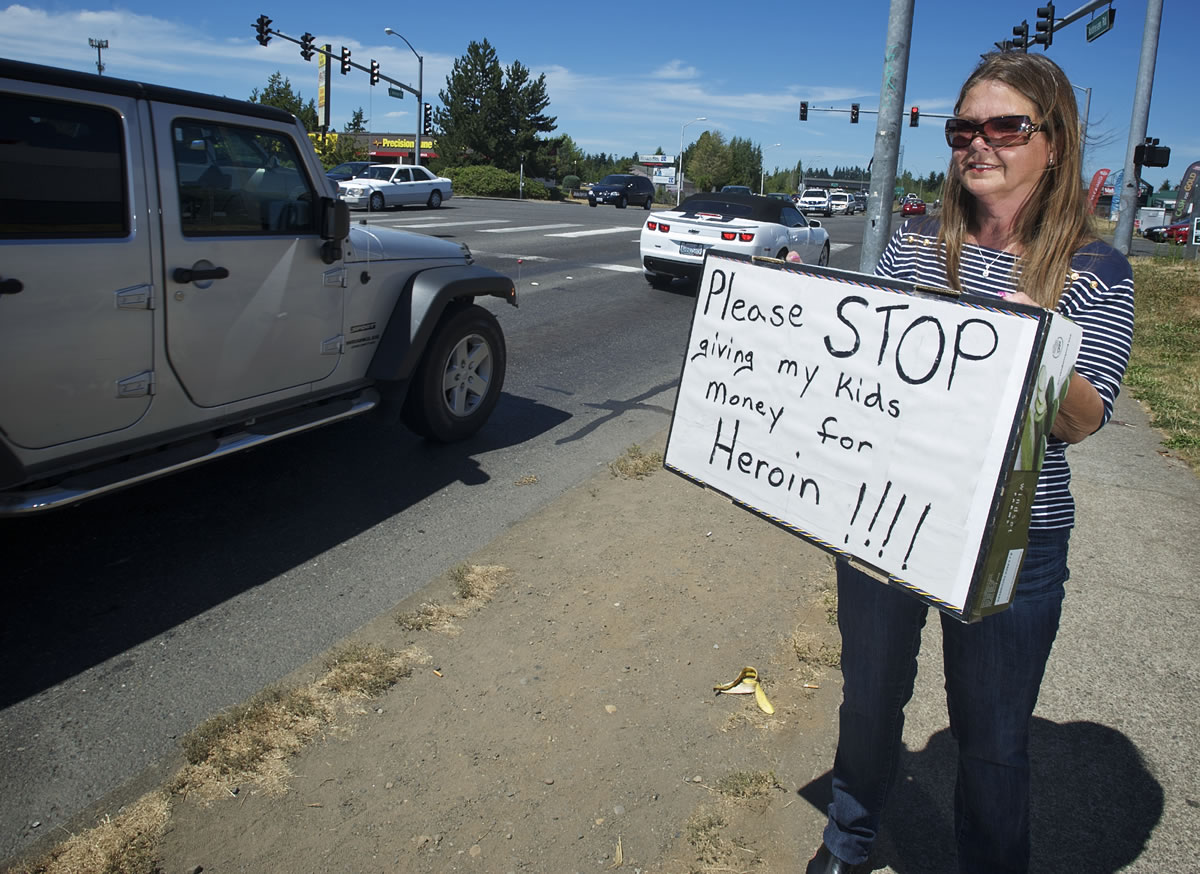PART 2: Spring. Stuck in the cycle of recovery and relapse.
PART 3: Summer. Ups, downs and a turning point.
Teri Joy first noticed Heather’s bulging belly as she drove under the Interstate 5 overpass on Northeast 99th Street in Hazel Dell. Eight months’ pregnant, she held a small cardboard sign at the side of the roadway, asking for some charity. In the corner of the overpass sat Heather’s boyfriend, Steven Joy — Teri’s stepson.
Anguish punched Teri in the gut.
“You want to cry, but you can’t because you’re so mad. You want to shake him, but at the same time hold him and hug him,” she said in an interview.
As she drove home, hauling her Costco groceries, she thought back to an idea that had idled in her mind for months.
o Panhandling is considered a form of free speech, protected by the U.S. Constitution. Panhandlers won’t be bothered by law enforcement unless they’re committing some other crime — such as impeding traffic, trespassing or harassing passers-by.
What if she made her own sign? What would she say?
At her home in Felida, she unloaded the groceries and flipped over one of the cardboard boxes. She stared at its blank, white canvas before printing a message: “Please stop giving my kids money for heroin.”
“That was my release,” Teri said. “That was the way I decided to do it.”
Fueled by anger and adrenaline, she drove back to Hazel Dell, parked at WinCo and started walking to the overpass, carrying her sign. Steven and Heather, who asked that her last name not be used, came around the corner on their way back from McDonald’s. Steven read the sign and walked quickly past her without saying a word.
He knew what she was up to, she said. And he was mad. The encounter left her shaking, almost to tears.
“I didn’t want to be that,” she said. “I wanted to be the strong one.”
When she got to the Northeast 99th Street exit ramp, she stood up straight and smiled. Motorists gave her thumbs-up, honks, waves and she heard several times “Good job, mom!” Some even tried to hand her money. The reaction made her feel like she was doing something, that somebody was paying attention. The police were called on her by people thinking she was asking for drug money, but the officer chuckled as he drove up and gave his approval. She has stood on the corner, and other popular panhandling spots, a handful of times since.
“It’s a way to get my frustration out, as opposed to going home and doing nothing.”
The sign was meant to make people think before they give to panhandlers. A well-meaning motorist may contribute to a problem, such as illicit drug addiction, without realizing it.
Though she would bring Steven food or coupons for burgers, Teri said she never gave the couple money to ward off withdrawal symptoms with drugs.
Steven Joy, 25, started using heroin in high school and dropped out in the 11th grade, said his mother, Elaine Joy. He began panhandling and stealing to feed his habit, not looking to get high, just to prevent the physical pain of drug withdrawal. A hit of heroin costs between $10 and $20, said Clark-Vancouver Regional Drug Task Force Cmdr. Mike Cooke. The cost for the user depends on how much they need to keep withdrawal symptoms at bay.
Fallout from giving out money
Teri used to roll down her car window to panhandlers. Only in the last few years has she closed her wallet.
“I had too much faith in humanness,” she said.
As she stood recently at the corner of Northeast Fourth Plain and Andresen roads, she pointed out food and a bag of dog kibble, presumably left behind by panhandlers. A lot of food, clothes and blankets were stuffed under the Northeast 99th Street overpass before the area was recently cleaned, she said. It’s something one might not notice unless they walked by and looked around.
Steven was booked into jail July 10 for burglarizing a residence off Northeast 45th Street, where a chop saw was stolen. At the end of the month, he was sentenced to 60 days in jail, with credit for 21 days served. His girlfriend, Heather, was weaned off heroin using a synthetic opioid and gave birth to a baby girl at PeaceHealth Southwest Medical Center.
Despite their absence, Teri still stands with her sign, believing the kids, or young adults, on the corners are all our kids. They’re somebody’s son or somebody’s daughter.
“In some bizarre way, if they could hear all the honks and waves in a moment of clarity …” Teri said, drifting off as tears came to her eyes, “it could change their way of thinking.”
She pulls the sign out of her trunk and sets up shop on the corner when she sees one of her stepchildren’s friends begging on the corner. Sometimes, she gets called names and receives obscene gestures from others working the corner. She stands her ground, believing it’s worth it even if just a single dollar doesn’t go to drugs.
“Take the dollars and divert it to somewhere that helps kids,” Teri said. “Support a treatment center.”




